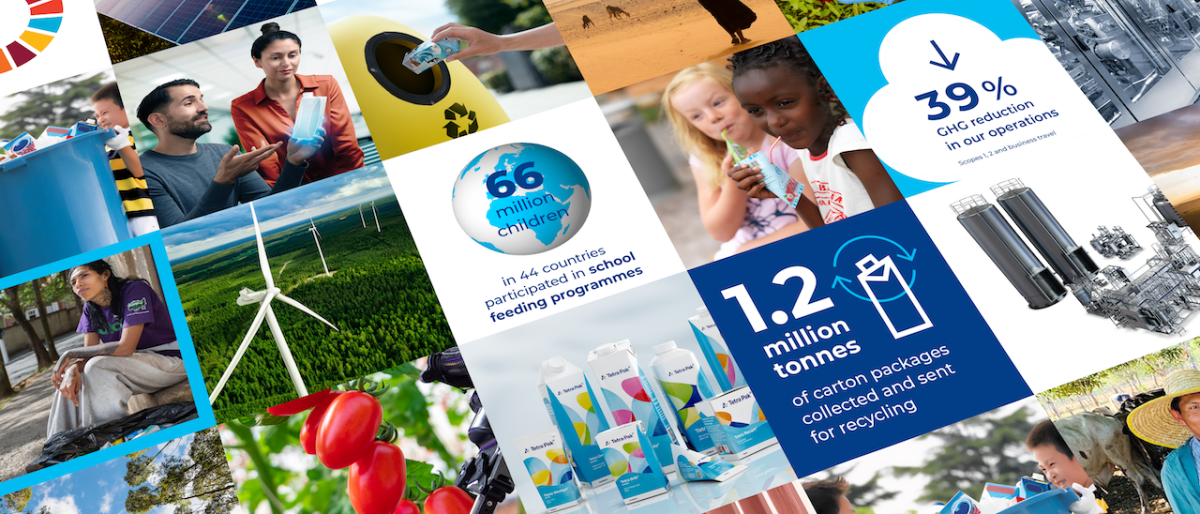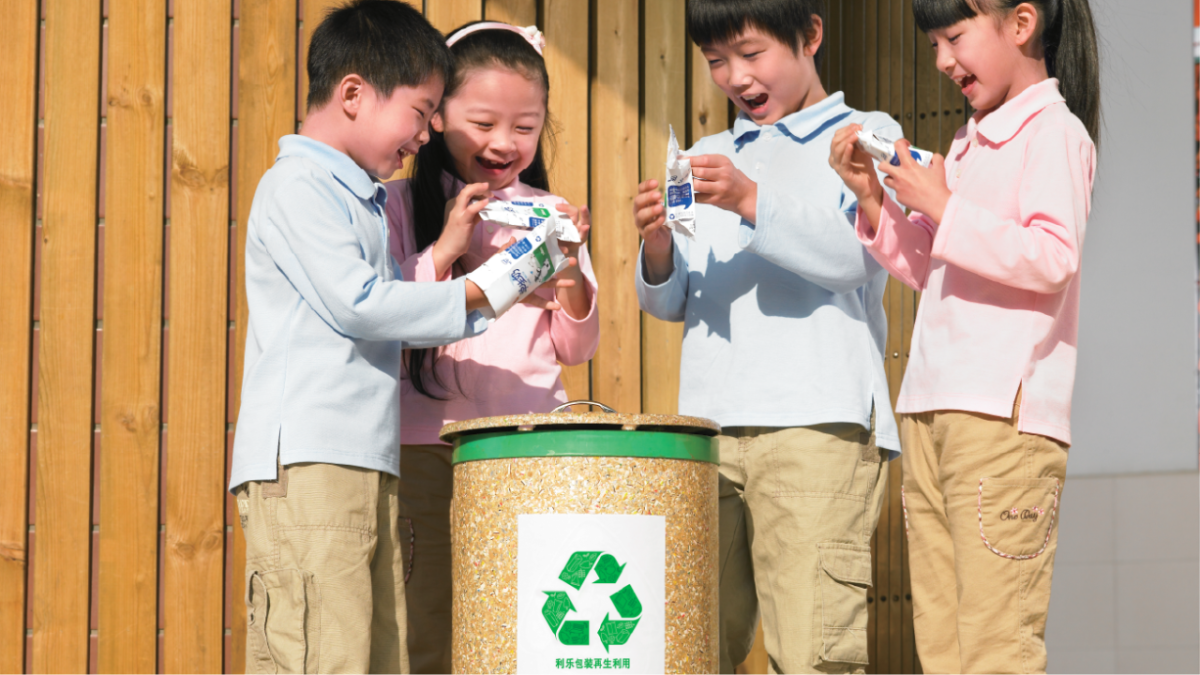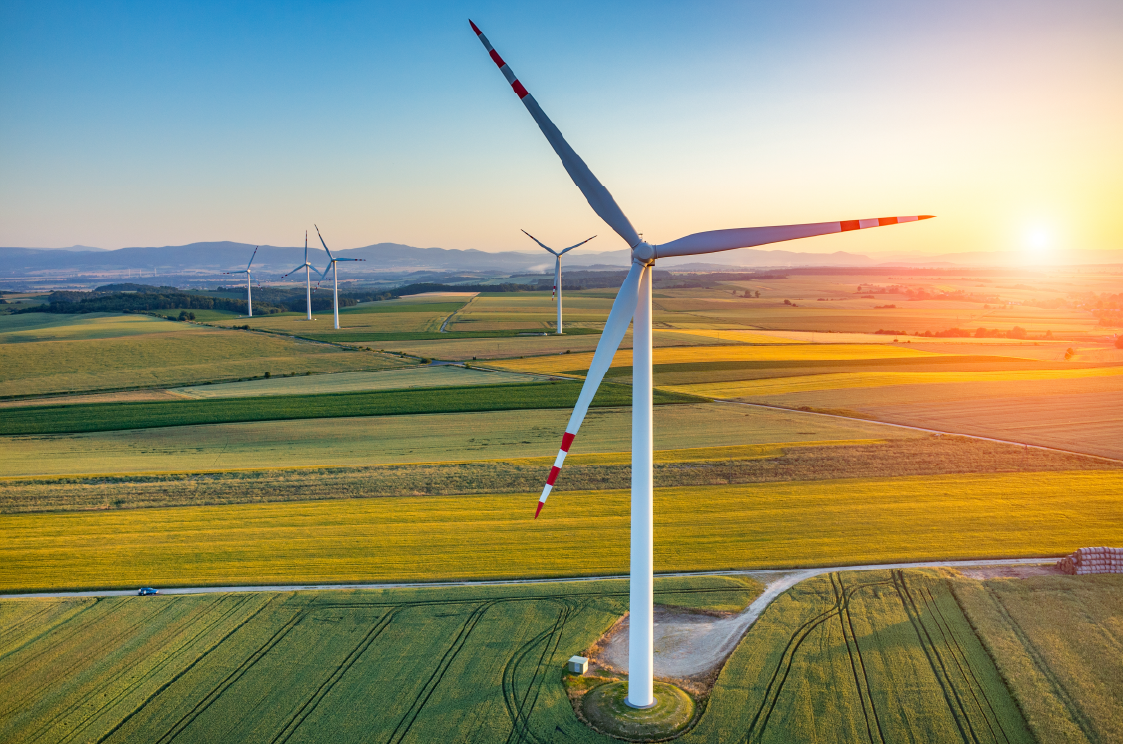Tetra Pak Makes Further Progress on Sustainability Transformation
Published 06-07-23
Submitted by Tetra Pak

Reflecting new milestones across climate, recycling, food systems and many other areas in its latest Sustainability Report
LAUSANNE, Switzerland, June 7, 2023 /CSRwire/: Today, Tetra Pak publishes its Sustainability Report FY22[1], highlighting the company’s progress across various aspects of sustainability. Now in its 24th edition, the report demonstrates how sustainability remains core to Tetra Pak’s strategy and continues to be prioritised in decision making.
During the year 2022, Tetra Pak achieved significant milestones, reducing operational greenhouse gas (GHG) emissions by 39%[2], with 84% of the energy coming from renewable sources[3]. This puts the company on track to achieve net zero within its own operations by 2030. Additionally, the sale of 8.8 billion plant-based packages[4] and 11.9 billion plant-based caps translated into 131 kilo tonnes of CO2[5] savings. Tetra Pak also invested nearly €30 million[6] to accelerate collection and recycling of beverage cartons, while working with food technology incubators and start-ups to explore the future of sustainable food.
This was in the context of a year marked by considerable uncertainty, driven by the after-effects of COVID-19, supply chain issues and geo-political challenges such as Russia’s invasion of Ukraine. The combination of all these factors has resulted in significant financial challenges for businesses and consumers, driving up the cost of living and resulting in food insecurity for many.

Adolfo Orive, President & CEO at Tetra Pak, says: “The current operating environment has emphasised the need for integrated, systemic solutions. This is the only way we can meet the scale and speed of change required to strengthen food access while reducing the environmental impact, in a way that leaves no one behind. This is why we have taken a holistic approach across five interconnected and interdependent areas where we can contribute the most - food systems, circularity, climate, nature and social sustainability.”
Tetra Pak’s Sustainability Report FY22 highlights the company’s achievements in the past year, and the ongoing initiatives to protect food, people and the planet. These include:
- Testing an industry-first fibre-based barrier to replace the thin aluminium foil layer in aseptic carton packages – a breakthrough in the company’s journey towards a fully renewable aseptic package.
- Recognition for leadership in corporate transparency and performance on climate change and forests by global environmental non-profit CDP, securing a place on its prestigious ‘A List’ for the fourth year running.
- Designing a new processing method for soya drinks, as well as a new technology to transform Brewer’s Spent Grain[7] into a plant-based beverage – for less waste and more nutrition.
- Enabling 66 million children in 44 countries to get access to nutritious beverages through school feeding programmes, helping to improve children’s health, increase school attendance and support agricultural development.
- Delivering milk to dairies in 22 Dairy Hub projects through approximately 44,000 farmers, in most cases smallholders, as part of the company’s long-term work to build local dairy value chains.
- Restoring 87 hectares of land - the equivalent of 136 football fields - through the Araucaria Conservation Programme in Brazil.
- Implementing UN Guiding Principles on Business and Human Rights[8] and making progress on diversity, equity and inclusion (DE&I).

Adolfo concludes: “With a solid environmental track record and a strong commitment to the future, we will continue to drive ourselves and others to work ever more closely and find sustainable solutions to the challenges we face as a society. After all, this is core to our purpose: 'We commit to making food safe and available, everywhere. And we promise to protect what’s good: food, people, and the planet.'"
The full FY22 report can be found here.
Media contacts
Lucia Freschi
Tetra Pak
Tel: +39 347 2632237
Lucia.freschi@tetrapak.com
1 Financial year 2022 (FY22) is the period from 1 January 2022 to 31 December 2022
2 Scopes 1, 2 and business travels
3 As a result of increasing the company’s on-site solar photovoltaics (PVs) capacity from 5.55MW in 2021 to 8.47MW in 2022
4 Volumes exclude Blend in BIO (BiB) sold in Brazil. BiB is a mix of 75% LDPE and 25% plant-based LDPE
5 Compared to the amount of CO2 which would have been emitted if using fossil-based plastic. Based on climate accounting internal calculations (volume x emission factor) considering 72.7 kilo tonnes of plant-based plastic purchased in 2022. To calculate the avoided emissions number, Tetra Pak uses a third-party emission factor for the plant-based polymers from public available lifecycle assessment by Braskem. Source: https://www.braskem.com.br/portal/imgreen arquivos/LCA%20PE%20I’m%20green%20bio-based_FINAL%20EN.pdf
6 Operational and capital expenditures
7 Brewer's Spent Grain is the industrial moniker used to describe the malt after a brewery has already used it to make beer. Source: https://www.regrained.com/blogs/upcyclist/what-is-spent-grain
8 The UN Guiding Principles on Business and Human Rights (UNGPs) are the global standard for business conduct concerning human rights. They're composed of 3 pillars: First, the state has a duty to protect people against human rights harm by business. It requires states to use all the tools at their disposal—law, policy, regulation, and adjudication—to protect against human rights harm by business. Second, businesses have a responsibility to respect human rights. That is, businesses should not infringe on human rights in their own operations, or in their business relationships (e.g. with partners, suppliers, and customers). That responsibility of businesses is much harder to realise when the state does not do its job, but the responsibility remains, nonetheless. Third, there is a need for greater access to remedy. This requires states & businesses to play roles in providing access to effective remedy—both judicial and non-judicial—for those harmed by business-related human rights abuse.

Tetra Pak
Tetra Pak
Tetra Pak is the world's leading food processing and packaging solutions company. Working closely with our customers and suppliers, we provide safe, innovative and environmentally sound products that each day meet the needs of hundreds of millions of people in more than 160 countries.
With over 24,000 employees around the world, we believe in responsible industry leadership and a sustainable approach to business. Our motto, “PROTECTS WHAT’S GOOD™," reflects our vision to make food safe and available, everywhere.
More information about Tetra Pak is available at www.tetrapak.com
More from Tetra Pak

